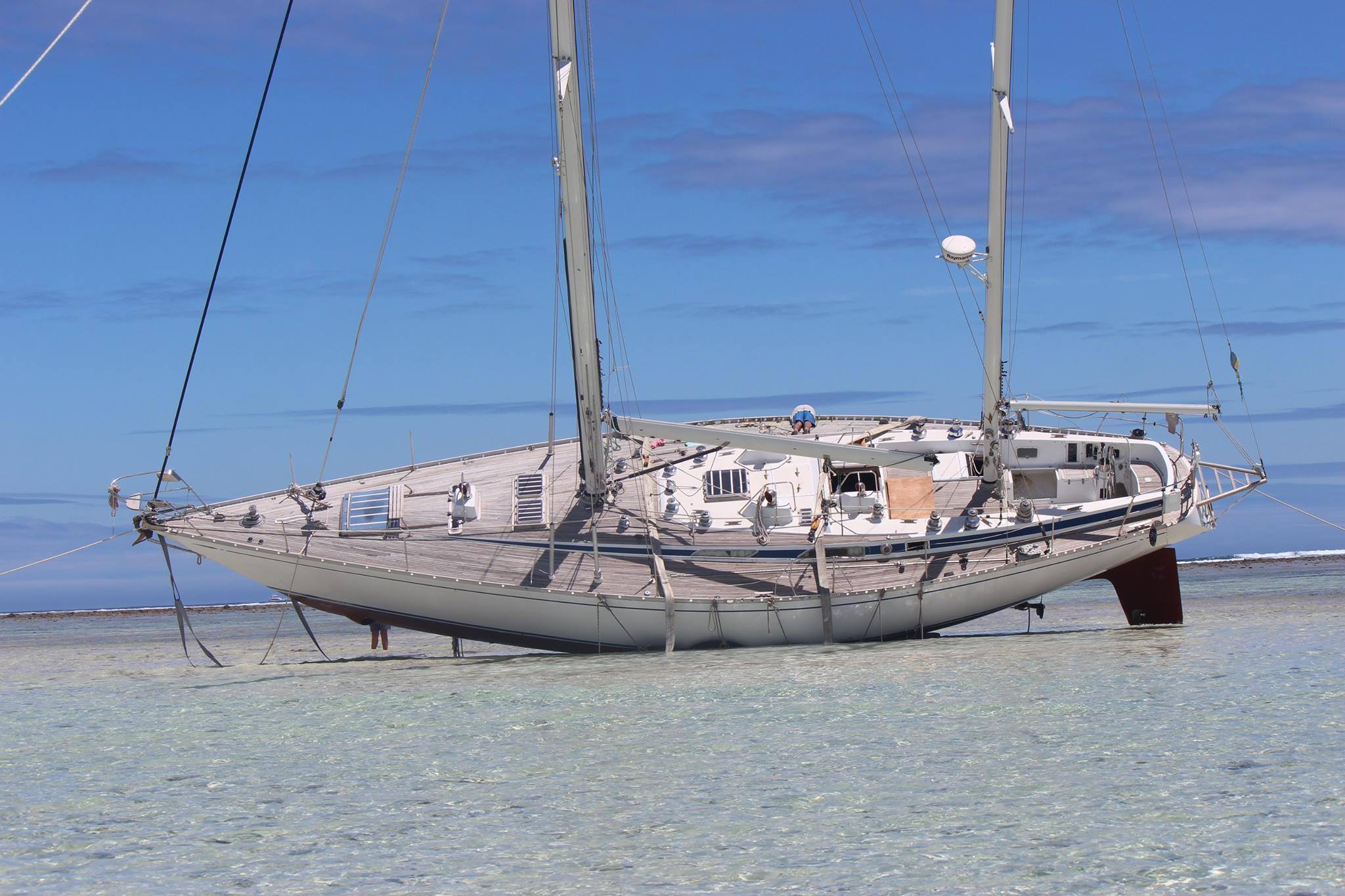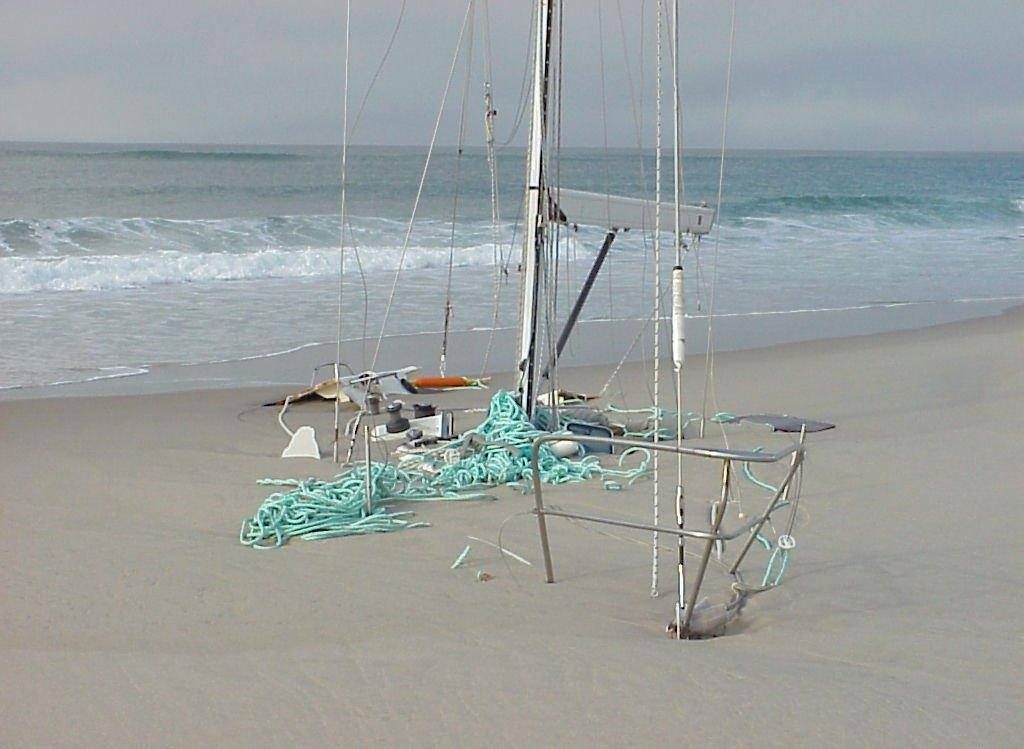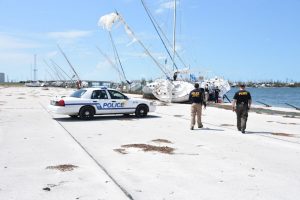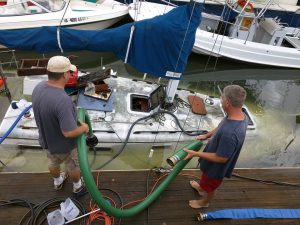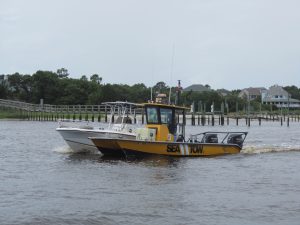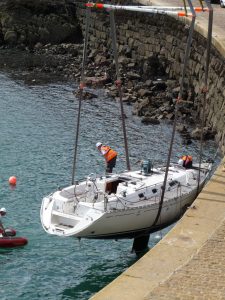The challenge of having your boat salvaged or recovered after a storm or accident can be intimidating and confusing. No two salvage operations are the same and dealing with insurance and salvage or tow companies can be complicated and tedious. There are many misconceptions and misunderstandings about marine salvage law and knowing your rights and responsibilities is important.
Protecting your interests and your responsibilities.
If you have insurance (which everyone should) you have more options for recovery in the event of a casualty. First, keep in mind it is your obligation to minimize further damage to the boat and the surrounding environment. This means taking action to prevent oil and hazardous waste spills into the environment as well as protecting the vessel from more damage. You also have to minimize damage to the physical environment such as reefs and docks. Take for example grounding on a coral reef, it is your obligation to secure the vessel to prevent it from dragging along the reef causing further damage. Your only real excuse for not doing any of this is if doing so, would put you or your crew in peril.
Insurance companies also expect the vessel owner to do what they can to protect the boat from further damage. This could mean putting tarps over openings to keep rain out, pickling or preserve engines, patch holes and in general doing whatever you can to prevent more damage and loss. Once again, this is, of course, only if these actions can be accomplished safely, no boat is worth risking injury to try and save.
If the vessel is beached you may also have to take action to prevent theft of equipment and gear attached to the vessel. If possible remove everything you can and place it in storage. Place warning and no trespassing signs on the vessel. A barrier of yellow safety tape may not keep the real thieves away but will often fend off the curious that may want to liberate a “souvenir” or two. Alert the police or local authorities of your situation and ask if they can help keep an eye on the boat until you can take further action. Letting the authorities know who to contact and that you are actively pursuing recovery will help prevent them taking action on their own as well. It may help to hire a local watchman. This is particularly true in some foreign ports as the locals will see this as your willingness to hire local help and builds goodwill, no guarantee but worth a try.
Understanding what salvage is.
The most common misconception many have is that if a boat is on the beach or adrift, it and its contents are free for the taking. In the US and many other countries, this is not true. Look at it like a car broken down on the side of the road, the car and its contents still belong to the owner, it is not just free for the taking. The same is true for boats. Anyone claiming a beached or adrift boat as theirs or taking things off a beached boat in the US is stealing plain and simple. Laws may be different in other countries so if your boat is aground outside the US you may want to contact the local authorities for advice.
Once the situation is stabilized it is time to think about salvaging the vessel and getting it to where repairs can safely and economically be undertaken. Here is where a bit of understanding of salvage law helps. There are really three types of salvage, First is the simple tow when a boat breaks down and there is no peril to the vessel or crew, Next is risk salvage where a vessel in distress is a risk to its self the crew or navigation, finally there is recovery salvage or wreck removal where a boat has been stranded or sunk and needs to be recovered. All these are treated differently by the law and there is sometimes a bit of overlap in each.
It helps to understand that salvage law and its rewards are in place to encourage mariners to help other mariners. These laws were originally set up for ships, not yachts, but they apply equally to both. In the eyes of the courts, a ship or rowboats the same when it comes to salvage law. There is no law that any sailor has to help another in peril, so really no incentive other than just goodwill to help any vessel in distress. In the past, this proved to be a problem as some unscrupulous individuals would watch a ship go down with the loss of the crew so that they could then salvage the cargo without fear of anyone left to want it back, so much for goodwill. Salvage laws were brought about to give those with thin morals an incentive to help save the ship and its crew thereby giving them a greater reward. The laws were written so that anyone providing assistance would be rewarded for that assistance and this still applies today. The reward amount was based on the risk and expense the salvors took to save the ship. The greater the risk and effort the greater the reward.
What this means to the average boater is that once a line is tossed to you to help get you off that sandbar the person or persons can then claim salvage. Of course, the average boater just wanting to help are not doing so in hopes of compensation but there are cases where this was not true. Anyone who helps whether a company or another boater just passing by can claim salvage rights.
Of course, a salvage claim can only be made should the salvage be successful. This is often referred to as “no cure no pay.” If for some reason the vessel and its cargo or contents are lost or damaged beyond repair during the salvage operation the salver is not entitled to any reward no matter what risk or expense was made during the attempt. The exception to this is if a contract was signed prior to the attempt that provided compensation for just trying.
Pure salvage verses Contract salvage.
The above assumes the salvage effort is voluntary, meaning no contract has been signed as can often be the case in an extreme emergency where action has to be taken quickly to avoid loss. There is another type of salvage called contract salvage. This is where the terms of the reward or payment are worked out in advance. Say your boat is stranded in the mangroves where there is no immediate danger but it still has to be moved and refloated. In this case, it is likely a contract will be negotiated ahead of time for the costs and rewards to the salver. Most tow companies use some form of contract when the tow goes beyond a simple pull off a mud bank.
There is a lot of discussion about tow companies and their rights for salvage. Many boaters pay a yearly fee to a franchise company for basic towing and assistance. This is a good but there is a fine line between assisting and salvage. Those with a yearly subscription would do well to read and understand the limits of their contract and understand when things go from a simple tow to salvage. Many tow companies will only cover costs for a simple grounding requiring only one tow boat and taking no more than 30 minutes if a second tow boat is required or the boat is deemed in peril your subscription will not cover the full cost and you will then be in salvage mode. Even a simple tow if done a certain distance offshore could be salvage and not covered in your yearly contract.
The line between assistance and salvage is usually crossed when the vessel is said to be in peril. Being in peril is often defined as the immediate or future well-being of the vessel or the vessel will cause a hazard to navigation. This is a bit vague really when you think about it. A vessel adrift may not be in immediate danger but could be in future danger if left on it’s on for days or weeks. Likewise a soft grounding may not seem like a big deal but if it is in the channel you become a danger to navigation and your simple tow can turn into salvage as you are a hazard to navigation.
Most of the franchise operators are pretty good and will cut you some slack but keep in mind each is an independent operator and each decides where the thin line is placed, not all are as forgiving and some may be downright shady. You do of course have the option of working disputes out with the national headquarters of these companies. There are also many small local tow companies not part of a larger company that can offer assistance. What this means to the boater is they have to be careful when seeking help, buyer beware should be the mantra when hiring a salver or tow company. I have known some tow companies to place a pump aboard your boat prior to giving a tow. They may claim it is for safety but the truth is once that pump is on your boat they can claim salvage as they can say the situation was so dire it required an emergency pump. Others may want to tape plastic over engine vents “in case the boat heels” once again this then turns the tow to salvage as they had to prevent water from entering the boat. There are other tricks used by shady tow operators but you get the point. Ask just what is involved before accepting the tow line. Make sure you are clear on what charges will be made. Do not get me wrong though, most of these operators are very professional and very easy to work with, it just a few that are not so great, so unless you know the operator, use some caution.
There are ways to protect yourself and depending on the situation, the first is to simply refuse the help. If you are a member of a tow service and the tow captain is wanting to do something you are not comfortable with call the headquarters and ask for clarification. You can also always ask for their fees and costs in writing prior to accepting the help. This, of course, assumes you are not in any danger. If there is any real danger to you or your crew or the vessel then do what you have to and sort it out later. Finally, try to take the time to take photos and video of the operation. Record data such as wind strength and wave height. All this can come in handy should there be a disagreement about charges.
Anytime you need assistance you should contact your insurance company as well. Let them know the date time and who helped you and how. Most insurance covers towing and salvage and they will want to know the extent of any damage. Even if you do not think any damage was done it is good to let your insurance company or agent know in case problems crop up later that are a result of the incident. Should the tow company hand you a giant bill that is more than you paid for your boat do not panic. Simply pass it on to your insurance company and they will sort it out. Slavers almost always hand out a bill for way more than they expect to get, it is all part of the salvage dance. The insurance companies will negotiate with the tow company for what is really fair. It is almost always cheaper to settle than go to court over a disputed bill.
If the boat owner or insurance company cannot come to terms over fees the dispute will often end up in binding arbitration before going to court. BoatUS offers this service for all boaters not just their customers. Generally, the reward is based on the risk the salver takes, the cost incurred by the salver, and the value of the vessel saved. These and other factors are taken into consideration to come up with a fair fee. The insurance company or owner then pays the agreed cost. If you do not have insurance you may be on the hook for the costs but you can still take advantage of the binding arbitration to settle for a fair amount. Rarely do cases end up in court for small vessels but it does happen. Few really win in such cases unless the yacht in question had a very high value to start with.
Wreck removal.
Another form of salvage is wreck removal. This is where the vessel has sunk or has been blown ashore from a storm. Your insurance company would be your main contact with this type of salvage. More often than not the insurance company will contract a salver to recover the vessel for a contract price based on the location of the vessel and degree of difficulty recovering the vessel. In some cases, the Coast Guard may have the vessel moved if the owner cannot be immediately contacted or the vessel is a hazard to navigation. A marina may also contact a salver should your boat sink or start to sink in the slip. With either of those cases, you may just be handed a bill you had no control over once the vessel has been removed.
Wreck removal can often require specialized equipment such as cranes and barges. It may also require divers for underwater recovery. This can add to the expense for this type of salvage. Once again this is why having insurance is so important. The problem with wreck removal is it can often exceed the value of the vessel being salvaged. It can also cause additional damage to the vessel or surrounding environment so the expenses can add up quickly. To add insult to injury, if the vessel is on a public or even a private beach for that matter the owner can often be given a short window of time to have the vessel removed without facing additional fines. In some cases, if the vessel is on land it sometimes may be cheaper and faster to simply break the vessel up and haul it off to the dump. This can be painful but may be the only practical option. If the vessel is submerged there may be no choice other than a having it recovered often only to be broken up and disposed of upon recovery.
The need for insurance.
If nothing else I hope those that read this can see the need for basic insurance that will cover towing, salvage and wreck removal along with oil spill cleanup. Nobody wants to think they will ever need it and with luck, most will not but it only takes a single incident to make the expense worth the cost. Sadly I hear of many without insurance that feel the answer is to just walk away from their damaged boat because the cost of recovery is too high and the value of the boat too low. The problem with this is sooner or later someone is going to pay for the removal and it will likely be taxpayers most of whom have never been on a boat. In my mind that is simply wrong and irresponsible of a boater owner to do. I would hate to see it come down to insurance being required like it is for cars.
The foregoing is offered for general information purposes only, and may not be construed as a legal opinion or advice.
Useful links:
U.S. Open Form Salvage Agreement, known as the MARSALV contract (view PDF). (Every vessel should have a copy of this aboard.
http://commettelaw.com/maritime-law-attorney-florida/towing-salvage-lawyer-florida/
https://offshorerisk.com/en/knowledge-base/understanding-the-difference-between-towing-and-salvage/
